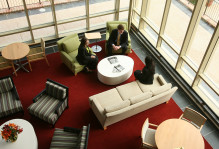Coming to the College of William & Mary: Transitions in Life
Life is transition. To believe that one’s life has stability or is predictable is to be believing an illusion. Losing my sense of stability may be what is best for me.
I have just completed my first semester at William & Mary. It’s been a privilege to work with such highly motivated people. My position here is indefinite – I may be here for a single academic year or the next 20 years.
Previously, I taught as a graduate student at a large Midwestern state university and as a PhD in Economics at secular and faith-based private, liberal arts colleges and universities in Minnesota, Kansas, and Kazakhstan.
I came to W&M as a non-tenure track, visiting faculty member. In the language of academics, stability and predictability are embedded in terms such as “tenure-track,” “accreditation,” “endowment,” and “full professor.” Tenure-track positions do not absolutely guarantee employment, but they suggest that you are on that path. Accreditation is akin to the Gold Seal of Approval by an external agency that vouches for the quality of one’s programs. An endowment is the gift of money to the university, which is usually held in perpetuity, and the interest augments operating capital. Full professor is the highest teaching job-title one can attain. These terms denote permanence.
On the other hand, in the academic world the states of transition and uncertainty are embodied in terms such as “Adjunct,” “Visiting,” “Special Topics Course,” and “non-tenure track.” Adjunct faculty are usually those who possess professional experience that adds value to academic programs. They serve as part time faculty. A “Visiting” faculty member is usually only around short-term. A Special Topics Course is something being tried to see if student interest will support the trial course. Non-tenure track positions are given to full-time, professional educators who focus upon teaching rather than research and teaching. They are also more expendable as they work on annual contracts, rather than long-term contracts.
Where is this discussion going? The purpose is to discuss transition. For 14 years my position was as a tenure-track faculty member, as a department chair, as an Associate Professor, or in an endowed Assistant Chair in my department. I came to William & Mary as a Visiting Assistant Professor. A weak economy, too few college-age students, and poor leadership decisions in my last institution resulted in a downsizing which changed my status. My world changed from one of at least semi-permanence to one of transition. I am not convinced that that is a bad thing.
Human beings crave stability and security. We will make what seem to be poor choices in order to maintain this – remain in a weak relationship; stay in a job we dislike; or choose a major for “job security” rather than passion. The problem is, stability is an illusion and transition is the reality. Nothing in nature lacks change, why should we follow different rules?
Loved ones leave us and others enter our lives. Unemployment occurs and jobs are changed. Who we are in our 20’s is not who we are in our 40’s. Whether it is the weather; our metabolism; or the common style of jeans, everything is in a state of change. Life is a concert of changing movements that weave together an orchestral composition of experiences.
My mistake was to believe the illusion that I was “settled;” that my life was fixed as Associate Professor of Economics; mother; wife; adopted Midwesterner.
The experience of feeling settled and secure is that we stop striving and thereby growing. We have defined ourselves, finito. Learning, whether it be formal education or through experience, is about redefining oneself: what you like; what you can do; how you understand the world. Not only is permanence an illusion, but it is an illusion to which we should not even aspire. Changing ourselves, and thereby our lives, is how we continue to expand our experience. We just don’t like it, because having to change makes us feel quite uncomfortable.
Our lives are more like a series of “Special Topics Courses” than an “accredited program.” We change the cities in which we live, perhaps for employment, but just as much to see how we like them. Most of us will change careers once or twice. Many of us marry more than once and may then forge a completely new combined family. We become excited by a new experience or challenge; it is non-routine. We find value in learning something new and augmenting who we already are. Though we may feel that stability is a goal, deep-down we are not even fooling ourselves. Change is scary, because it changes who we are, but it is very exciting. It is what creates memories of a “life well lived.”


No comments.
Comments are currently closed. Comments are closed on all posts older than one year, and for those in our archive.